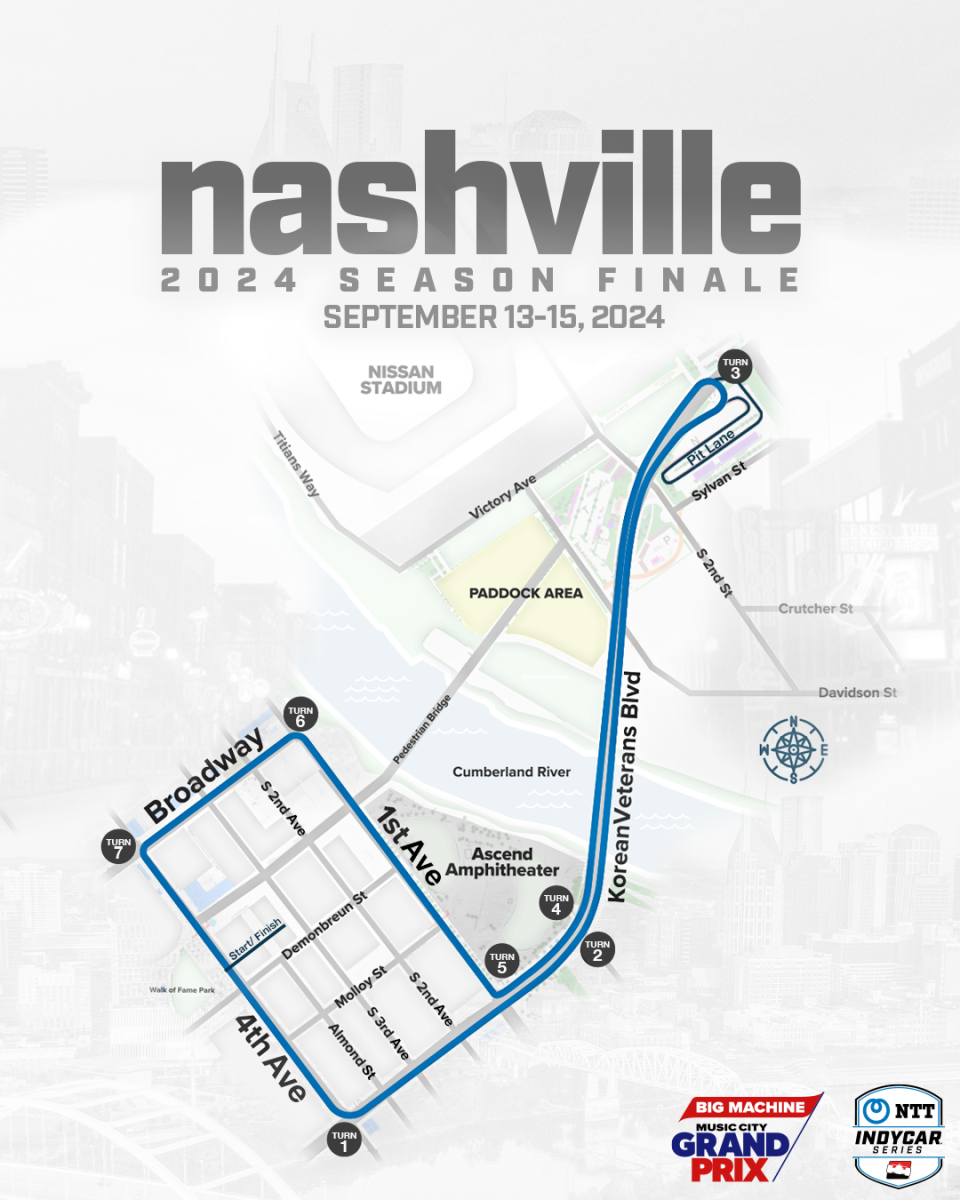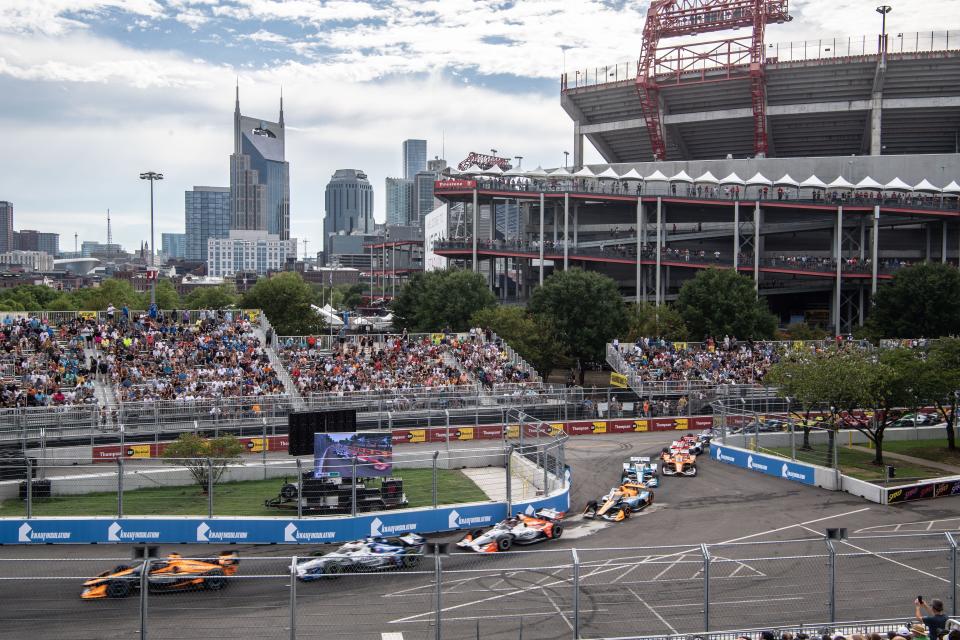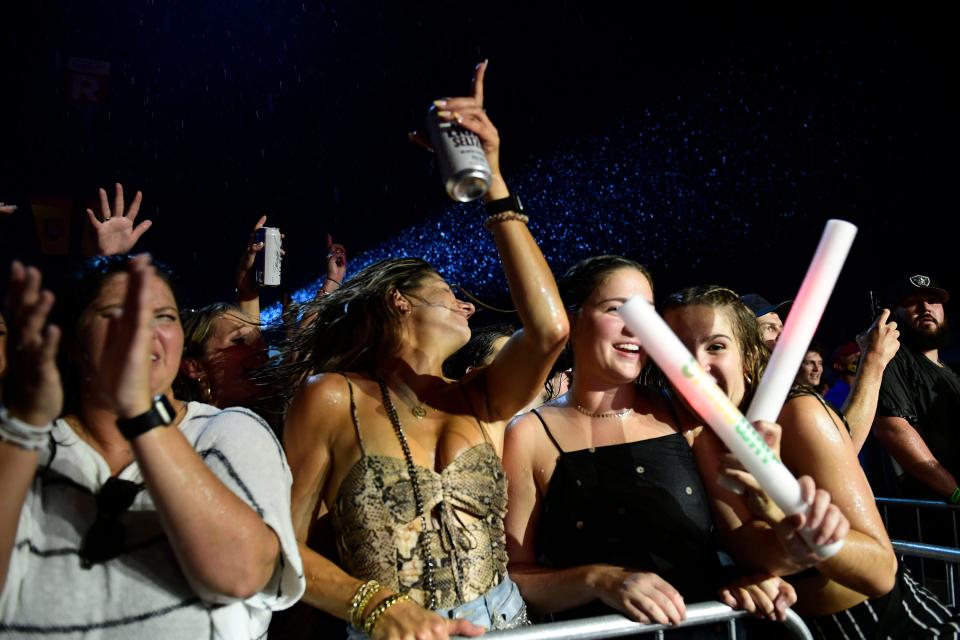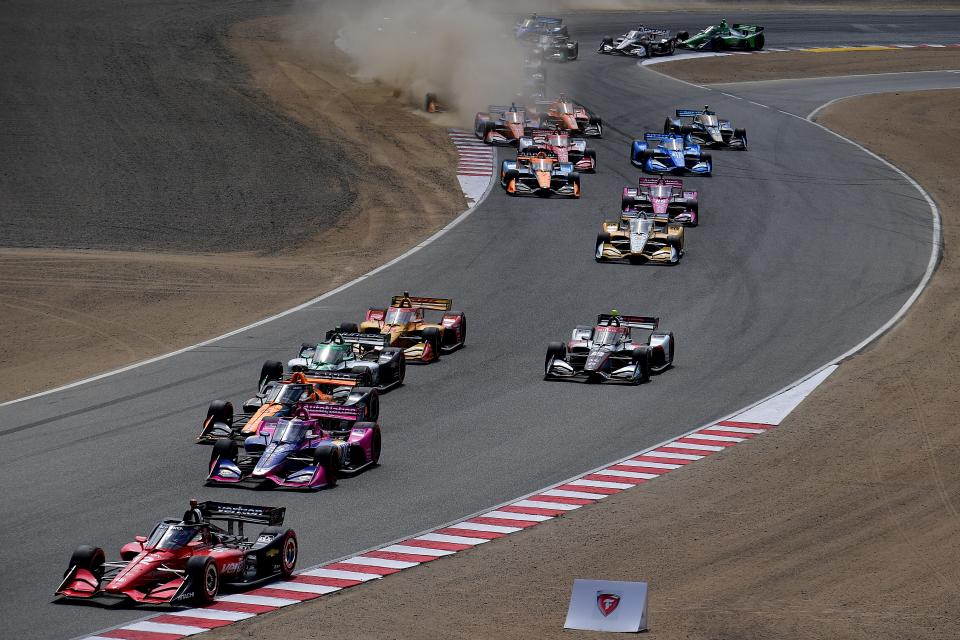Insider: Answering all your questions about IndyCar's future season-finale in Nashville
Just how big do IndyCar and Music City Grand Prix officials believe the next iteration of the race through Nashville can be?
In terms of ticket sales, at least: more than twice as big as it's been during its first two years, and the biggest event on the calendar not named the Indianapolis 500.
In its release confirming the Music City Grand Prix’s move into IndyCar’s season-finale slot starting in 2024, event organizers said they expect more than 250,000 fans next September – well beyond the estimated 130,000 and 117,000 the event drew in Years 1 and 2, respectively.
How do they hope to do that? Below are answers about IndyCar’s new season-finale from the announcement’s release and my chat this week with Penske Entertainment Corp. president and CEO Mark Miles.
When will the race be held?
The 2024 Music City Grand Prix weekend will begin Friday, Sept. 13, with the race held mid-afternoon Sunday, Sept. 15. Rather than happening the weekend following Labor Day (Sept. 2 next year), the race is one week later and on the second weekend of the NFL season.
There’s no indication whether the 2024 IndyCar season will end with back-to-back races (or, like this year, back-to-back-to-back), but the series will crown a champion by mid-September. There's no change in that likely for the foreseeable future.
Miles said he doesn’t foresee the NFL's Tennessee Titans – or anyone with the city – needing to request that the team be away during a race weekend. The course only briefly runs on streets close to the stadium, and race and series organizers will make necessary changes if it's sharing the time slot with a Titans home game.
Getting ready for '23 race: Why IndyCar apologized to Music City Grand Prix officials in 2022

Do we know the course yet?
Yes. The 2.17-mile course includes seven turns and two significant straightaways made up by the Korean War Veterans Memorial Bridge – which is part of the original course – and a couple tenths-of-a-mile running down the city's famed historic Lower Broadway between First and Fourth Avenues.
The start-finish line sits between Broadway and Korean Veterans Boulevard on Fourth Avenue, and drivers will quickly pass by the Country Music Hall of Fame before a 90-degree left-hander (Turn 1) from Fourth Avenue onto the stretch of road that leads to the Bridge. Once over the Bridge, drivers will make a tight hairpin turn just past Second Street that marks Turn 3 in order to come back towards downtown for the rest of the course. The entrance to the track's pitlane sits right at the start of that hairpin turn, with the entrance back onto the track right at the corner exit at the start of the long stretch back over the Bridge.
Once back over the Bridge, drivers will then make a 90-degree righthand turn onto First Avenue on the other side of the Bridge for Turn 5, with the left-hand corners onto and off of Broadway marking Turns 6 and 7 to complete the course. That stretch on Broadway, according to the release, passes through a stretch of honky-tonks owned by renowned country music artists Jason Aldean, Dierks Bentley, Luke Bryan, Garth Brooks, Eric Church, Alan Jackson, Miranda Lambert, John Rich and Blake Shelton.

How did the conversation around the shakeup start?
Conversations that eventually arrived at this new iteration of the Music City Grand Prix began months ago, according to Miles, while the sanctioning body and event promoters had dinner in Nashville to discuss navigating the Titans Stadium construction project, where the event's paddock is currently housed. Original thoughts included a slimmed-down event with a course that could revert back to something near its original form in a few years, with the use of a new state-of-the-art stadium as its focal point after its completion in mid-2027.
At some point this year, however, that changed.
“The people in Nashville are not bashful about promoting their city, and they’re confident in their ability to put on big events. I think even before doing our original agreement (ahead of the race’s debut in 2021), they were saying, ‘…and maybe someday we can be the finale,’” Miles told IndyStar. “Quite frankly, we hadn’t done two races (and) didn’t know how things would go, so we didn’t give serious consideration to that.
“Fast-forward to a couple months ago, and they presented plans to move the event right downtown in the heart of everything, and our first reaction was, ‘This is fantastic. It could be sensational, in this fast-growing, high-profile, major, exciting urban market. If it can be done, we love the plan.’ And then they said, ‘Well, since it’ll be bigger and better, why don’t we talk about the finale?’ And it probably didn’t rise to debate at the time, but when (PEC vice president Michael Montri) and I were on the way home, we thought and realized, ‘You know, they’re right. This is the right kind of city for a very vibrant event with national – and in some ways international – impact for the series that puts one of our two biggest events in the biggest possible light.’”
How will the new Titans Stadium affect the race?
According to Miles, significant future use of the East Bank of the Cumberland River – including the Titans’ future digs – hasn’t been a major discussion topic, and he doesn’t see that changing.
Is this all really finalized?
In terms of getting approvals from city officials, Miles said yes – while adding that Nashville Mayor John Cooper was a big proponent of not only the switch in sites, but the vision for what will be the season-finale starting in 2024.
“(Mayor Cooper) always liked the idea, but he needed to see it to understand how it was going to work,” Miles said. “I think he was positively predisposed to the idea because he saw the vision of being even bigger and more important, and they ultimately executed a signed agreement between the city and the promoter.”

What about Music City Grand Prix entertainment?
Much of the entertainment opportunities around the race are still a work-in-progress. There are opportunities for the honky-tonks and bars that border the course to use their rooftops as VIP hospitality space that could be rented out either by teams, the series, sponsors or other entities, but specifics are undecided.
As expected, Miles said, live music will have a massive presence in making next year’s Music City Grand Prix feel as big off-track as the stakes will feel on it. “Each day of racing will culminate with a takeover of Broadway and a massive street party that only Nashville can throw, featuring live performances by many of music’s biggest artists,” the release said.
Some of that, Miles explained, will be directly organized by the promoters, while other portions of the weekend’s entertainment could simply involve shows and concerts put on by those honky-tonk owners independent of the race.
Additionally, the season-ending awards ceremony will take place a day after the finale (Monday Sept. 16) at the Schermerhorn Symphony Center that sits in the downtown entertainment district between Third and Fourth Avenues. The historic venue has long hosted musical titans from Dolly Parton to Harry Styles, according to the release.
Will this be the IndyCar finale for more than just 2024?
Miles said PEC and the folks who run the Music City Grand Prix are still finalizing a new sanctioning agreement, but there’s no concern about such a deal not getting done with Thursday’s news. And when it is, it’s everyone’s plan to have this race as the season-finale “for as long as it continues to be the best possible place to stage a finale,” Miles said.
Could the Music City Grand Prix be a night race?
Miles said a night race in Nashville at that time of year isn’t feasible. New for this year, NBC – IndyCar’s exclusive broadcast rights partner – will air one Big Ten football game each Saturday in a prime-time slot. The channel is also the home of "Sunday Night Football" – TV’s most-watched prime-time program for more than a decade now. Swapping out either for an IndyCar race (no matter the stakes) is a non-starter.

What' will happen with Laguna Seca?
Miles said IndyCar and WeatherTech Raceway Laguna Seca are in talks about when to schedule the race that has served as the season finale in 2019, '22 and '23. Though a much-talked about March date – one that would fill a hole in the schedule between the opener in St. Pete and the previous second race of the year at Texas in early-April or late-March – is on the table, it’s not guaranteed, Miles said.
Weather for that area of central California – the average high temperature is barely above 60 degrees – remains a potential roadblock and is part of the discussion.
“I think they’d prefer to be the finale. They like being on the IndyCar schedule, and our agreement with them provided for the conditions under which things would work if they were the finale, but it didn’t lock that in,” Miles said. “They’ve always known it was possible that might not continue, but we’re working with them now on finding a new favorable date and expect that will happen.
“I don’t want to say, ‘We’re hoping’ (for March). Obviously, we’d like to fill that gap, but we and Laguna Seca want to believe there’s a date that can work for them, too. It’s one of the options.”
Insider: IndyCar weighing several changes for 2024 schedule. Here's what's on the line.
What's left to decide before the 2024 IndyCar schedule is finalized?
Outside of Laguna Seca’s future race date, Miles said the series is continuing to look at possibilities for the return of the Milwaukee Mile in 2024, along with the feasibility of holding an international non-points-paying event after the end of the 2024 regular season – most likely in Argentina – before announcing the schedule. That unveiling, he said, is targeted for near the Sept. 10 finale.
This article originally appeared on Indianapolis Star: IndyCar: Answering questions about new 2024 Nashville season-finale
